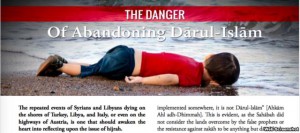The photo of Aylan Kurdi, the drowned 3-year-old Syrian boy whose lifeless body was found washed up on a Turkish beach last week, is by now distressingly familiar.
Published by hundreds of media outlets all around the world, the shocking images of the small child who died fleeing war and terror in his homeland has stirred the conscience and emotions of Europe.
So the photo’s appearance in the latest edition of the Islamic State (IS) group’s propaganda magazine, Dabiq, this week is upsetting.
But it is not surprising.
IS is highly media-savvy — and, of course, has no qualms about using the death of a child to warn about what awaits the children of other Syrians who try to escape its rule.
‘Liberalism, Fornication, And Drugs’
The Dabiq article reveals — unwittingly — part of IS’s sensitive underbelly: its deep concerns that Syrians and Iraqis living in IS-controlled lands are so desperate to leave that they risk death to do so.
IS, it seems, felt it had to issue a reaction to the claims prompted by the outpouring of emotion over Aylan Kurdi’s death, which said that Syrians were fleeing to Europe to escape IS’s barbarity.
The militant group’s response was to warn Syrians that leaving IS-controlled lands is a “dangerous major sin” that will result in “one’s children and grandchildren abandoning Islam for Christianity, atheism, or liberalism.”
Even if Syrian refugee children in Europe do not become “infidels,” they will be “under the constant threat of fornication, sodomy, drugs, and alcohol,” Dabiq preaches.
And those children who do not “fall into sin” will still suffer, because they will forget how to speak Arabic, the language of the Koran and Islam, warns Dabiq.
Beyond its religious preaching, IS also appeals to a rawer, more basic instinct: Parents are told that, if they flee, their children will probably die “during the dangerous trip to the lands of the war-waging crusaders.”
To drive its point home, the article is illustrated with an image of refugees cramming into the back of a van. “Many Syrians died on the road to darul-kufr (“the lands of the infidels”),” the caption reads.
Hijacking ‘Hijrah’
The article also shows how IS has usurped Muslim terms and ideas for its own propaganda aims, in this case the concept of “hijrah,” a Muslim term that originally meant the peaceful migration of Muslims to areas where they would be free from persecution.
According to Rebecca Gould of the University of Bristol in the U.K., IS has militarized the idea of hjirah, using it as a recruitment tool to persuade Muslims to move to IS-controlled territory.
In its article, Dabiq argues that, with the establishment of the “caliphate” — IS’s term for the lands under its control — Muslims should make hijrah to IS territory. IS claims that Muslims are not permitted to move to areas in Syria and Iraq controlled by non-Islamic groups, and certainly not to the United States or Europe.
As usual, Dabiq tries to situate its argument that Muslims should not leave IS territory within a religious framework, using quotes about hijrah from the Koran, the hadith, and Islamic scholars.
Bashing Refugees
The Dabiq article is playing on existing sentiment among IS and other militants in Syria toward Syrian refugees headed for Europe.
After the photo of Aylan Kurdi went viral last week, IS militants took to social media to slam refugees, accusing them of abandoning Islam and going to “infidel” lands.
Some of the harshest criticism came from IS foreign fighters outraged at the idea that Syrians and Iraqis do not like IS rule.
One Chechen IS militant and media activist in Syria, who tweets under the handle @akhbarig, tweeted that “many refugees migrants (sic) in order to get a residence permit in Europe sold their religion and became Christians.”
Многие беженцы мигранты чтобы получить вид на жительство в европе продают свою религию и становятся христианами. хех pic.twitter.com/UKXwLhLEDO
— Военкорр (@akhbarig) September 5, 2015
Abu Aisha al-Kazakhi, an IS militant based in Mosul and originally from Atyrau in Kazakhstan, criticized Syrian male refugees for dancing with women when they reached Europe.
But the criticisms did not only come from IS militants.
Abu Ubaidah, a Syrian national and ethnic Circassian who fights alongside a Chechen-led group, Ajnad al-Kavkaz, posted an image listing the dreadful fates that militants believe await refugees in Europe, including un-Islamic laws, nudity, and polytheism.



